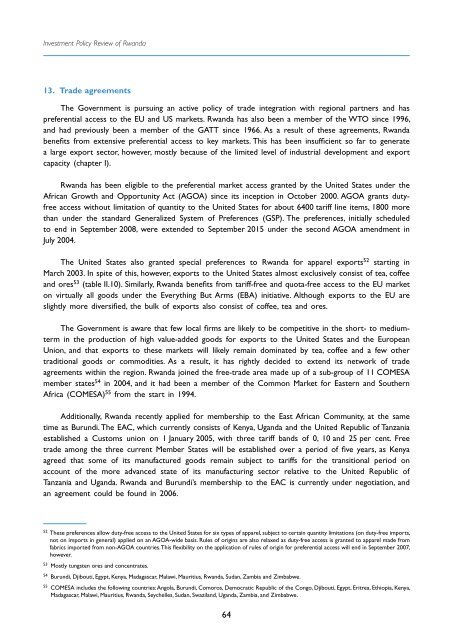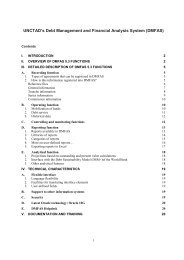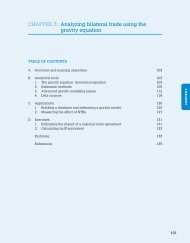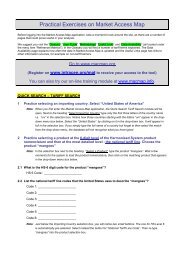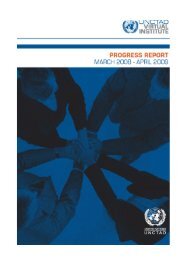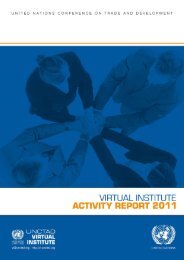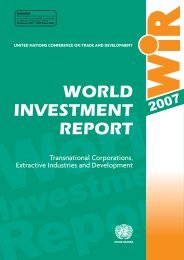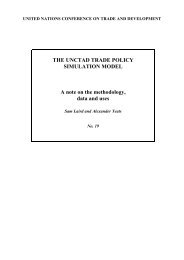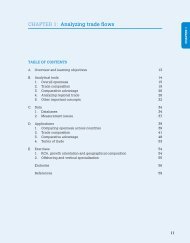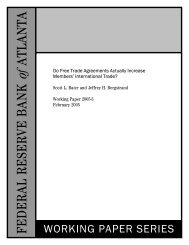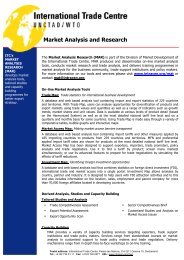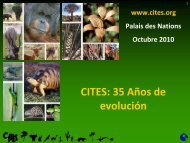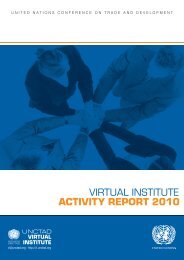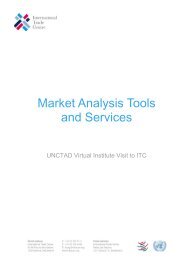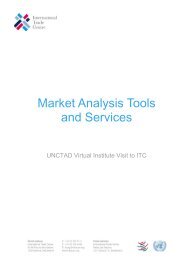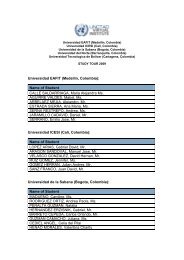Investment Policy Review - Rwanda - UNCTAD Virtual Institute
Investment Policy Review - Rwanda - UNCTAD Virtual Institute
Investment Policy Review - Rwanda - UNCTAD Virtual Institute
You also want an ePaper? Increase the reach of your titles
YUMPU automatically turns print PDFs into web optimized ePapers that Google loves.
<strong>Investment</strong> <strong>Policy</strong> <strong>Review</strong> of <strong>Rwanda</strong><br />
13. Trade agreements<br />
The Government is pursuing an active policy of trade integration with regional partners and has<br />
preferential access to the EU and US markets. <strong>Rwanda</strong> has also been a member of the WTO since 1996,<br />
and had previously been a member of the GATT since 1966. As a result of these agreements, <strong>Rwanda</strong><br />
benefits from extensive preferential access to key markets. This has been insufficient so far to generate<br />
a large export sector, however, mostly because of the limited level of industrial development and export<br />
capacity (chapter I).<br />
<strong>Rwanda</strong> has been eligible to the preferential market access granted by the United States under the<br />
African Growth and Opportunity Act (AGOA) since its inception in October 2000. AGOA grants dutyfree<br />
access without limitation of quantity to the United States for about 6400 tariff line items, 1800 more<br />
than under the standard Generalized System of Preferences (GSP). The preferences, initially scheduled<br />
to end in September 2008, were extended to September 2015 under the second AGOA amendment in<br />
July 2004.<br />
The United States also granted special preferences to <strong>Rwanda</strong> for apparel exports 52 starting in<br />
March 2003. In spite of this, however, exports to the United States almost exclusively consist of tea, coffee<br />
and ores 53 (table II.10). Similarly, <strong>Rwanda</strong> benefits from tariff-free and quota-free access to the EU market<br />
on virtually all goods under the Everything But Arms (EBA) initiative. Although exports to the EU are<br />
slightly more diversified, the bulk of exports also consist of coffee, tea and ores.<br />
The Government is aware that few local firms are likely to be competitive in the short- to mediumterm<br />
in the production of high value-added goods for exports to the United States and the European<br />
Union, and that exports to these markets will likely remain dominated by tea, coffee and a few other<br />
traditional goods or commodities. As a result, it has rightly decided to extend its network of trade<br />
agreements within the region. <strong>Rwanda</strong> joined the free-trade area made up of a sub-group of 11 COMESA<br />
member states 54 in 2004, and it had been a member of the Common Market for Eastern and Southern<br />
Africa (COMESA) 55 from the start in 1994.<br />
Additionally, <strong>Rwanda</strong> recently applied for membership to the East African Community, at the same<br />
time as Burundi. The EAC, which currently consists of Kenya, Uganda and the United Republic of Tanzania<br />
established a Customs union on 1 January 2005, with three tariff bands of 0, 10 and 25 per cent. Free<br />
trade among the three current Member States will be established over a period of five years, as Kenya<br />
agreed that some of its manufactured goods remain subject to tariffs for the transitional period on<br />
account of the more advanced state of its manufacturing sector relative to the United Republic of<br />
Tanzania and Uganda. <strong>Rwanda</strong> and Burundi’s membership to the EAC is currently under negotiation, and<br />
an agreement could be found in 2006.<br />
52<br />
These preferences allow duty-free access to the United States for six types of apparel, subject to certain quantity limitations (on duty-free imports,<br />
not on imports in general) applied on an AGOA-wide basis. Rules of origins are also relaxed as duty-free access is granted to apparel made from<br />
fabrics imported from non-AGOA countries. This flexibility on the application of rules of origin for preferential access will end in September 2007,<br />
however.<br />
53<br />
Mostly tungsten ores and concentrates.<br />
54<br />
Burundi, Djibouti, Egypt, Kenya, Madagascar, Malawi, Mauritius, <strong>Rwanda</strong>, Sudan, Zambia and Zimbabwe.<br />
55<br />
COMESA includes the following countries: Angola, Burundi, Comoros, Democratic Republic of the Congo, Djibouti, Egypt, Eritrea, Ethiopia, Kenya,<br />
Madagascar, Malawi, Mauritius, <strong>Rwanda</strong>, Seychelles, Sudan, Swaziland, Uganda, Zambia, and Zimbabwe.<br />
64


